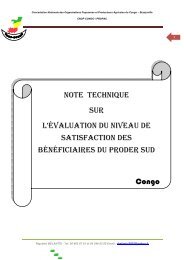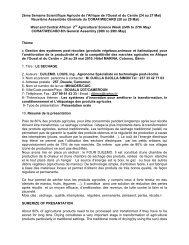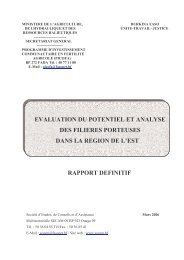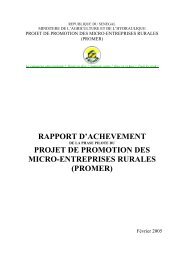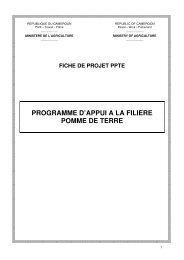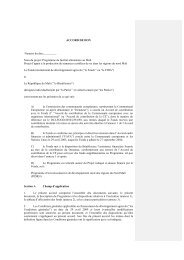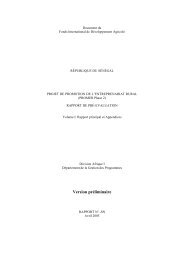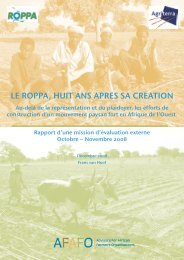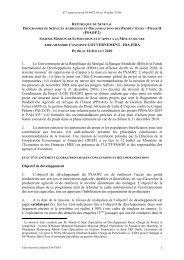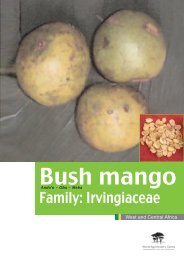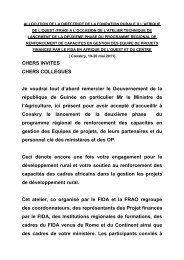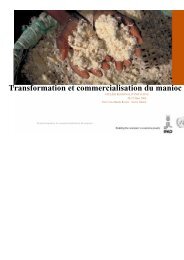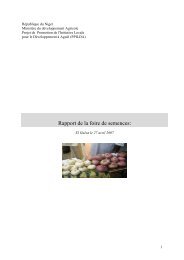Scaling Up the Fight Against Rural Poverty - FIDAfrique
Scaling Up the Fight Against Rural Poverty - FIDAfrique
Scaling Up the Fight Against Rural Poverty - FIDAfrique
You also want an ePaper? Increase the reach of your titles
YUMPU automatically turns print PDFs into web optimized ePapers that Google loves.
Moldova, IFAD could explore ways to improve its analytical capacity or draw systematically<br />
on that of its partners.<br />
• Conflicting country and corporate priorities: The government and key stakeholders want to<br />
see continued IFAD engagement in broad-gauged rural credit operations. IFAD’s corporate<br />
priority has traditionally been to focus on <strong>the</strong> rural poor. Moreover, IFAD’s current rural<br />
finance policies do not encourage targeted credit operations. Frequent changes in terms of<br />
government priorities for o<strong>the</strong>r design features (micro credit, youth employment, etc.) may<br />
undermine IFAD’s ability to stick <strong>the</strong> course in any one of <strong>the</strong>se areas. A proactive dialogue<br />
with all stakeholders and partners on <strong>the</strong>se tensions in <strong>the</strong> preparation and implementation of<br />
<strong>the</strong> COSOP will be helpful.<br />
• Country presence: Stronger country presence would be needed for effective and sustained<br />
scaling up in Moldova. Implementation of IFAD’s policy of enhanced country presence will<br />
help in this connection.<br />
• CPM overload: A competent and committed CPM is stretched by having to work on two<br />
countries, while multi-tasking across a wide range of functions, many of which have to do<br />
with <strong>the</strong> administrative management of <strong>the</strong> project pipeline in two countries. This constrains<br />
his ability to commission policy analysis, engage in policy dialogue, build partnerships and<br />
thus develop effective scaling up paths. IFAD might explore ways of streng<strong>the</strong>ning of <strong>the</strong><br />
country team, but this will likely require additional resources.<br />
B. Evaluation of three country programs: India, Nigeria and Sudan<br />
IFAD’s Office of Evaluation each year carries out evaluations of selected country programs. In 2009<br />
and early 2010 three country program evaluations – for India, Nigeria and Sudan – focused among<br />
many o<strong>the</strong>r issues on <strong>the</strong> question of scaling up. The range of results is instructive. A common feature<br />
noted in all three evaluations is <strong>the</strong> lack of systematic approach to scaling up.<br />
IFAD’s office of evaluation completed <strong>the</strong> Country Programme Evaluation (CPE) for India in October<br />
2010. 12 It noted that IFAD’s two country program strategies (in 2001 and 2005) for India included a<br />
reference to IFAD’s role in developing scalable interventions and explored opportunities for<br />
partnerships and identified areas for policy dialogue, but that it did not contain a strategy for<br />
knowledge management. 13 The evaluation also notes that <strong>the</strong> India program shows a number of<br />
successful scaling up and replication examples. But it concludes that <strong>the</strong> approach was not systematic<br />
and could have addressed additional dimensions, including more effective partnerships with<br />
government, a more intensive policy dialogue, better linkages to key national rural development<br />
programs, and more effective approaches to scaling up in microfinance.<br />
The Nigeria CPE was published in September 2009. It gave less attention to <strong>the</strong> issue of scaling up<br />
than <strong>the</strong> India CPE. It notes that in <strong>the</strong> Nigeria COSOP “[i]nnovation and scope for replication and<br />
scaling up [are] reasonably well described, albeit without specifics.” 14 It briefly refers to <strong>the</strong> fact that<br />
successive projects “followed a logical pattern of synergy” in building on previous success and notes<br />
specific examples where this took place. However, <strong>the</strong> CPE also concludes that policy dialogue and<br />
knowledge management were insufficient. While IFAD sought partnerships with <strong>the</strong> international<br />
financial institutions <strong>the</strong>se were not systematically developed and no effort was made to participate in<br />
multi-donor Sector-Wide Approaches (SWAps). The CPE cites <strong>the</strong> lack of effective country presence<br />
12 IFAD Office of Evaluation (2009a)<br />
13 Ibid., paras. 64, 66.<br />
14 IFAD Office of Evaluation (2009b), p. 18<br />
22



